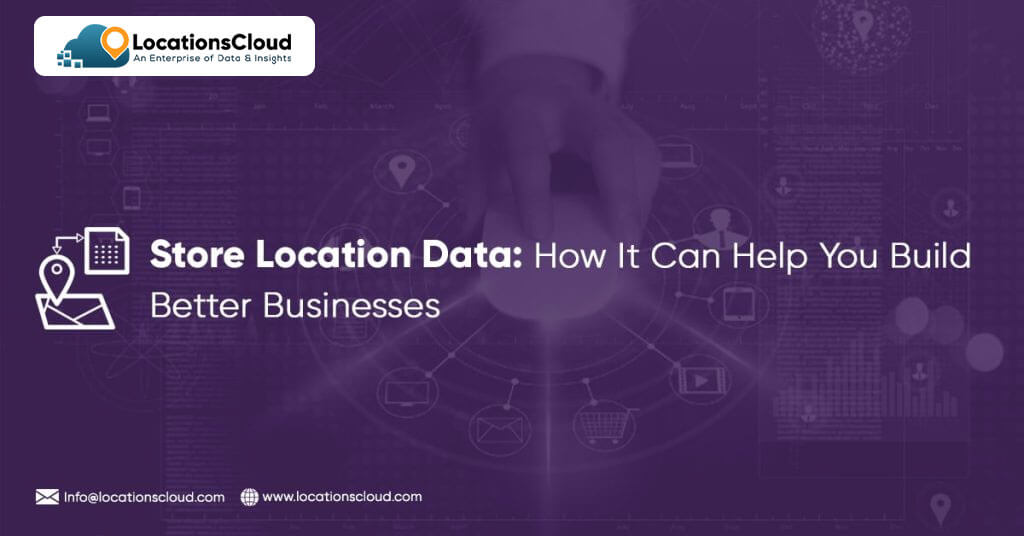
Location data is one of the most valuable data sources for businesses. It can help you understand how your customers behave, where they are located, and how they move and interact with your products or services.
It can also help companies make better local advertising and marketing campaign decisions.
For example, if you are a retail store and want to increase foot traffic during off-peak hours, then you can use location data to identify which areas of town have more people who work during those times of the day.
This information can help you decide whether to advertise in those areas or direct some of your employees there during off-peak hours.
This article will explore why location data is essential for businesses and how to use it to build better businesses.
What Is Store Location Data?
Store location data is the information that describes where a store or location is located, such as its address, phone number and website.Retailers use store location data to make important decisions about operating their businesses.
For example, if you own a shoe store, you might use this information to evaluate what type of shoes are selling best in your area and which retail locations are most successful at selling them. Companies like UPS or FedEx can also use store location data to determine which stores should receive deliveries first and when.
Types of Store Location Data
1. Store Locations
This is the most basic type of store location data. It includes the address, phone number, and hours of operation for each store location. This information can be used to plan marketing campaigns, develop sales strategies, and more.
2. Point of Interest Data
POI data is the most basic form of location data. It provides information about stores, restaurants, landmarks, and other attractions in specific areas that can be used for marketing purposes. This data type is often used for local search and discovery features on mobile devices.
3. Geographical Data
This type of information describes an area’s location and surroundings, including climate and topography. Geographic data is often used to determine where to place stores based on their proximity to other locations or suitability for certain types of businesses.
4. Demographic Data
This type of information is more valuable than just plain store addresses because it tells you things like income levels and age groups in a specific area. It can help you determine which locations might be more profitable for your business.
Various Store Location Data Fields
Store location data fields are a set of information that describes a specific location. The data fields are used to identify the business name, address, phone number and other important details about the store. This data can be used for various purposes such as customer support, marketing and advertising campaigns, customer loyalty programs and more.
The following list includes some of the most common store location data fields:
Business Name: The name of the business or organization that owns or operates the store.
Address: The address of the store in question including street name, city, state/province and country.
Phone Number: The phone number associated with the store location.
Website URL: The website associated with the business or organization that owns/operates the store location.
Opening Hours: The hours during which customers can visit/shop at this particular store location during any given day/time period via their website.
Hours Info: Additional information about opening hours such as weekdays only or 24/7 availability.
5 Major Store Location Data Category
1. Food Chains Store Location Data
The Food Chains’ store location data category is a rich source of information for businesses in the food industry. The data covers about 1,600 retail food chains in the US and Canada, including supermarkets, convenience stores, and drugstores. The data includes:
- Name of the business
- Location address
- Store hours
- Phone number
2. Pharmacies Store Location Data
It is more than just a list of locations. It’s a list of pharmacies with all the data points about them that you need to make informed decisions about your business. This includes:
- Store Name
- Address (Street, City, State, Zip Code)
- Phone Number (Business and Cellular)
- Fax Number (Business and Cellular)
- Website URL (If Applicable)
3. Grocery Store Location Data
This is a type of retail data that tells you where to find all the stores in your area. This information is incredibly valuable for businesses, as it helps them determine where to open new locations and where to expand existing ones. The data includes:
- Grocery store name
- Grocery store address
- Grocery store phone number
- Distance from home or work address
4. Gas Stations Store Location Data
It is another significant data category that help you know the location of the
Gas stations are a hot spot for retail store location data. A gas station can be an invaluable asset to any brand, as it provides the opportunity for increased foot traffic and visibility. The convenience of the location, combined with the fact that most people use gas when they travel, has made this type of business a staple in many communities. The data includes:
- Address
- City
- State/Province
- Zip Code
5. Automotive Store Location Data
Automotive store location data is valuable for automotive manufacturers, dealerships, and service providers. The data can be used for market analysis, customer acquisition, product development, and more.
How Store Location Data Can Benefit Your Business
Store location data is a powerful tool that can unlock new opportunities for your business.
The store location data can provide you with crucial insights into the layout of your store and customer behavior. You can use this information to identify problem areas, in-store layout, or customer traffic flow and make changes that improve your customer experience.
For example, let’s say you own a coffee shop in Seattle. You might have one store on the north side of town and another on the south side. Your data will show how far these two stores are from each other and other businesses in their respective areas.
That information can help you:
- Make better decisions about where to open new stores or remodel existing ones
- Identify profitable locations for future expansion
- Determine where to target advertising dollars
- Gain a deeper understanding of your customers’ needs and preferences
- Optimize marketing campaign for better performanc
- Reduce costs by eliminating wasted ad spending on low-return areas (or by focusing advertising in high-conversion locations).
- Measure the effectiveness of store locations, such as their proximity to competitors’ stores or their traffic flow (known as “traffic counts”).
Best Store Locator Data Service Provider
You have read the article and now you have gained enough knowledge about the store data location. Now it is time to get a reliable store data service provider who can provide you with all the information that you need to run your business successfully.
Location Cloud has been a leading provider of location based services since 2017. Their mission is to help businesses leverage the power of location data to drive results by providing them with high quality location based services at an affordable price.
They have a team of experts in delivering high quality data for all your business needs.
Locationcloud is a location data service provider. We are a team of experts in delivering high quality data for your business needs.
Wrapping Up
1. Symphony of the Forest
2. Ode to a Mountain
3. A River’s Journey
4. The Dance of the Fireflies
5. A Breath of Ocean
6. The Song of the Wind
7. The Secret Life of Trees
8. The Beauty of a Sunrise
9. The Majesty of the Night Sky
10. A Meadow’s Serenade






